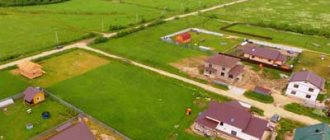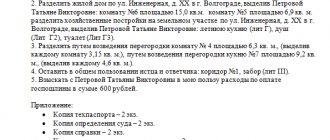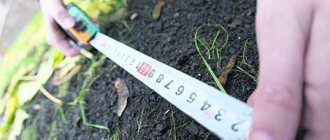On March 1, 2015, a law came into force according to which all private plots of land must undergo the privatization process. It is also noteworthy that this can be done completely free of charge. If privatization has not yet been formalized, you can no longer delay the issue. Otherwise, when checking, this fact will be discovered, and you will have to pay a fine.
Submitting an application
An application for privatization must be submitted to the authorized government body; for garden plots, this is the land committee of the local city administration.
The application is drawn up in accordance with the approved form, the form of which can be downloaded here.
At the top of the title page, the paper feed location is indicated, followed by the following information:
- Last name, first name and address of the applicant-gardener;
- Land category of the site (agricultural land);
- Possible presence of encumbrances;
- Type of right to the plot and details of the certificate of such right;
- List of buildings located within the boundaries of the garden plot;
- Details of ownership of the house (if any).
Upon receipt of the application, the gardener must be given a receipt with a list of documents provided.
Timing and cost
The processing time for citizens' applications upon prior approval and receipt of permission is a maximum of 30 days. Geodetic work along with paperwork lasts 7-14 days, and registration of property rights in Rosreestr takes 14 days.
Thus, the maximum period for privatization from the moment of filing an application for approval is three months, and if you have a cadastral passport - two.
If privatization is free, the applicant only needs to pay a state fee to the Rosreestr authorities - 100 rubles.
How to rent land for building a private house? You will learn how to allocate a share in special cases in our feature article.
You will read in our material how to take the extract you need from the house register.
Procedure for carrying out the procedure in the Russian Federation
If the land plot is still in municipal ownership, you have every chance of becoming its full owner. But to do this you need to follow a series of sequential steps.
List of documents
The composition of the package of documents may vary depending on individual circumstances. But employees of a government agency may require the following documents:
- A decree or certificate that confirms the fact that the plot has been provided for use.
- Passport of the citizen for whom the certificate or resolution was issued. A photocopy will also be required.
- Cadastral passport.
- A passport issued by the BTI for all immovable objects located on the site.
- Certificate from the state register about the non-commercial nature of SNT.
- Constituent documentation of the partnership.
- Extract from the Unified State Register.
- If a person is a member of the SNT, a photocopy of his book will be required (how to privatize land in the SNT?).
How much does it cost to register a property?
The cost of the land privatization procedure itself . If a citizen participates in the dacha amnesty program, registration is free of charge. But there are also paid ways to become the owner of an allotment.
In the first case, you will need to buy it from the legal representative. If the plot was issued by the state free of charge, then you can register your own right.
You must pay the state fee:
- For areas that are intended to be used for individual housing construction and SNT, etc., a state duty of 350 rubles is provided.
- For other land plots 2,000 rubles.
You can pay the state fee both at the government agency itself and through the government services portal.
We wrote separately about how much the procedure for privatizing a land plot costs, the price for preparing documents, and state fees, but here you can familiarize yourself with the procedure and methods for the privatization of a land plot.
What else can you get a fine for?
Modern conditions of the law provide private property with full ownership, but there are a number of conditions that cannot be violated. Otherwise, a fine may be issued. This will happen in the following cases:
- Increasing the actual area of the site. If it is discovered that the occupied area does not comply with the parameters shown in the cadastral documents, you will first have to pay a fine and then return the correct boundaries. It will be especially difficult for those who have owned the land for a long time and no longer have documents. In this case, challenging the cadastral “borders” will not be easy. If squatting has actually been carried out and the site is not vacated, the authorities have the right to take compulsory actions;
- Damage to the fertile soil layer. The site is transferred into ownership on the condition that there will be no storage of waste or construction materials or improperly equipped toilets on it. It is forbidden to destroy or harm the soil.
In some cases, a fine may be imposed for installing a well on the site.
How to Sell a Non-Privatized Plot in Snt
From January 1, 2021, it will be possible to register at a dacha, but for this it is necessary that the house meets the requirements for permanent residence and is built on the territory intended for this. According to the law, a residential building must be capital, with communications installed and an assigned postal address. In addition, the house must meet certain standards. It should not have more than three floors, and its height should not exceed 20 meters.
However, if before January 1, 2021, the building was registered in the Unified State Register of Real Estate as “non-residential” and it is not an outbuilding, then such a building will automatically be recognized as a garden house and it will not be possible to register in it. Starting from the new year, all permanent buildings will be registered in the Unified State Register of Real Estate. Those objects that were registered with the status of a residential building will be equated to residential starting from the new year, and those citizens who were registered as housing before January 1, 2021 will retain registration, unlike those who have a summer garden house. It will not be possible to register in it, since it is not a permanent building with appropriate communications.
Starting from the new year, the list of buildings that can be erected on vegetable plots and garden plots will change. Now the construction of any real estate on them will be prohibited. On such a site it will be possible to build only temporary outbuildings for storing equipment and crops. And on the garden it will be possible to build only a garden house, and not a residential one. Such a structure will not be considered residential, but will serve exclusively for recreation and temporary stay of people, since it is not permanent.
“Federal Law No. 217 finally destroyed gardening non-profit partnerships, obliging citizens on these lands to build only buildings for gardening equipment, that is, they offer to spend their rest time under the scorching sun or pouring rain,” says Golosova.
Gardeners who want to register a residential building will need a building permit. Such a document is not needed until the end of this year. Now you can register a residential building at the MFC by providing documents for the site and a technical plan. In addition, starting from the new year, a notification procedure for construction and registration of property rights in SNT will be introduced. Before you start building a house, you will need to notify the local government or village administration. This can be done by registered mail, in person, through the MFC or through the government services portal. Mandatory sending of such a notification will apply to residential buildings, as well as buildings for gardening and summer cottage farming. Those owners of dacha or garden plots who began construction or reconstruction of a residential building (on a dacha plot) or a residential building (on a garden and dacha plot) introducing amendments to the Town Planning Code on August 4, 2021, may send such a notification before March 1, 2021.
Any member of SNT, until December 31, 2021, can receive free of charge a vacant plot of the partnership that has been part of it since at least October 30, 2001, without any bidding, unless the general meeting is against it.
At the same time, according to Golosova, there are a number of reservations. “A member of the partnership can obtain ownership of a land plot free of charge until December 31, 2021, but at the same time, the SNT territory must have an approved boundary design. And today, half of the SNT have not yet been included in the Unified State Register of Real Estate, this is an expensive pleasure. To make a boundary design, it will take time and money. And by this time, the limited period for obtaining ownership of a land plot for free will expire,” says Golosova.
According to paragraph 12 of Art. 54 of Law 217-FZ, if a gardening partnership is located within the boundaries of a populated area and all the houses in it are recognized as residential, then the owners, through an appeal to the local administration, achieve a change in the status of the lands on which the SNT stands, to the lands of populated areas with the permitted use of individual housing construction. In this case, SNT is transformed into a homeowners’ association and lives according to the norms of the Housing Code.
Registration of a land plot in SNT (privatization) is possible provided that the plot is included in the Unified Register and has a cadastral number. You can find out whether land surveying was carried out from the management of the partnership. The necessary information can also be obtained by requesting an extract from Rosreestr. If the plot of land is not included in the register, the procedure begins with filing an application for its cadastral registration.
The procedure begins with collecting documents. The owner of the plot needs to contact the management of the association with a written request for the issuance of documents confirming his membership in the partnership. In this capacity you can use:
- a certificate signed by the chairman;
- an extract from the minutes of the meeting on admission to the partnership;
- list of SNT participants.
The last two documents must be certified by the board. In addition you will need:
- an extract from the minutes of the general meeting on the distribution of plots between the participants of the association (if it was not held, you can request lists, statements or other papers confirming the distribution of land);
- copies of documents confirming the fact of transfer of land to the partnership (enterprise or organization).
The SNT board may not have papers on hand confirming the fact of transfer of land. This usually happens when plots were given to employees of Soviet enterprises, most of which have long since ceased to exist. In this case, the owner of the plot will have to contact the archive.
It may happen that the boundaries of the plot of land, which is registered as a property, were not previously determined. In such a situation, you will need to request additional information from the SNT management:
- about the number of the entire allocated plot according to the cadastre;
- on approval of the land surveying project, organization and development of the territory.
When reading these papers, you need to pay attention to whether they contain information about a specific allotment, by whom and when the projects were approved.
If the SNT lands on which the allotment is located were allocated in the period after the adoption of the Land Code, the project documentation must be approved without fail. In the absence of documents, the owner of the plot will first have to contact a cadastral engineer. He will prepare a diagram of the location of the plot on the cadastral plan of the partnership's land.
The opportunity to register a SNT land plot as a property is available to citizens who have reached the age of majority. The exception is cases when the land was transferred to minor citizens by a member of the partnership by inheritance. A prerequisite is full civil capacity. When submitting an application, he will have to confirm the ownership of the plot with documents (we announced the list of documents above).
You can privatize a plot of land for free provided that:
- the plot is located within the boundaries of the SNT territory;
- the land was transferred to the gardening partnership before the adoption of the Land Code of the Russian Federation (before November 10, 2001);
- the allotment was assigned to the user by decision of the general meeting as a result of the adoption of another document by which the allotments were distributed among the participants of the association;
- the land was not withdrawn from circulation; no decision was made regarding the allotment on reservation for the needs of the state or municipality.
In the latter case, the land is allowed to be transferred to the user without bidding solely under a lease agreement. The land user should pay attention to the fee. Its amount cannot be greater than the amount of land tax paid by owners of similar plots.
If we are talking about land transferred to the partnership after the entry into force of the Land Code of the Russian Federation, registration
Ownership of
such is possible only for money. It is handed over to the user after concluding a purchase and sale agreement with the municipality.
In order for the user to obtain ownership of the land allocated for gardening, he must submit a corresponding application to the local government. This may be city authorities (if the plot is located within such a locality) or a specialized property management committee. If the site is located outside the city, the appeal is arrested by the district leadership.
The law does not determine the form of the document. Its sample can be found at municipal stands or downloaded from government websites. It states:
- full name of the body to which the appeal is addressed;
- personal data of the applicant;
- location of the land;
- information about the SNT on whose territory the land is located;
- cadastral number;
- grounds for ownership of the plot (the list is indicated at the beginning of the article);
- date of allocation of the land plot;
- list of attached documents.
The appeal displays the conditions for starting the procedure (construction of buildings, inheritance, request for privatization, etc.), and the grounds must be indicated.
The appeal must necessarily contain information that the applicant has not previously used the right to free privatization of the plot.
The application for registration of the SNT land plot as a property can be downloaded from the link.
You can submit an application in person, send it by mail, apply through the MFC or via the Internet. The last method involves applying through the official website or portal of the State Service.
The application will not be accepted unless it is supplemented with a certain package of papers. The applicant will be required to provide:
- diagrams of the location of the allotment on the SNT plan (submitted if there are no specific boundaries of the allotment, land surveying projects, organization and development of the partnership);
- a document confirming that the applicant is a full member of the SNT or other grounds for application (for example, a will);
- minutes of the general meeting of members of the partnership on the distribution of land or an extract from it (another document confirming the fact of distribution can be used);
- cadastral number of the land allocated to the partnership (if any).
After receiving the application, the municipality requests an extract from the Unified State Register of Legal Entities on the association (this procedure is provided if the first application is received from community members) and information on documents establishing land rights from Rosreestr or the regional archive.
Within two weeks from the date of application, local authorities make a decision. They can approve the layout of the plot (if this has not been done previously) and carry out free privatization of the plot or refuse to transfer the land into ownership. In the latter case, the decision must be motivated. The applicant has the right to challenge it in court. In this case, a statement of claim is drawn up. The information contained in it is confirmed by relevant documents. You need to be prepared for the fact that the consideration of the case may be delayed, so you should get a preliminary consultation from a specialized lawyer and, if possible, entrust him with representation of interests in court. The presence of a specialist will significantly increase the chances of success.
According to the Land Code of the Russian Federation, owners of privatized houses do not automatically become owners of the land on which they are located.
However, they receive it for indefinite use with the possibility of registering it as their own.
How to privatize a plot of land for a private house?
There are several ways to obtain ownership rights:
- take advantage of free privatization;
- buy a plot;
- receive a court decision.
Each method has its own characteristics. You can use the gratuitous transfer of real estate only in relation to certain categories of plots:
- territory received for use on an indefinite basis, and residential premises erected on it;
- agricultural land for the purpose of introducing personal farming;
- a summer cottage that is part of a gardening or other non-profit association.
ATTENTION! Plots that are part of gardening associations can be registered according to a simplified scheme until 2021, the end of the dacha amnesty.
Many homes, including many older structures, have multiple owners.
Is it possible to register land if the house has several owners?
Yes, it is possible to register the adjacent territory, but there are some conditions.
First, it is necessary to obtain consent to registration from all co-owners. Without their permission, it will be impossible to register the land plot under the property, because the law in this case provides for the submission of a joint appeal to government agencies.
Secondly, the territory will not only become your property - it will become common property. What to do if the house is in shared ownership, how to register the land?
The size of the shares will be proportional to the shares in the house. If you wish, after registration you will be able to buy out the shares of other participants, but this can also only be done with the voluntary consent of the parties.
Previously, we discussed in detail the process of filling out and submitting an application for privatization of a plot in the article at the link.
Why is privatization necessary?
Privatization, that is, the re-registration of a garden plot from state ownership to private ownership, will give the gardener the right to carry out the following legal procedures:
- Sell, donate, exchange land;
- Bequeath the garden to the heirs;
- Divide the plot into several plots;
- Combine with a neighboring site;
- Rent out;
- Participate in a meeting of dacha owners.
It is possible to inherit a non-privatized garden plot only if it is used under the right of lifelong inheritable ownership; all other types of land use rights (except for property rights) do not make it possible to bequeath a garden.
The sale of a non-privatized plot in SNT is possible, but complicated legally, since the gardener is not selling the plot, but membership in a non-profit gardening association, which gives the right to use the plot.
In most cases, this circumstance reduces the cost of the garden by 15-20 percent due to buyer concerns.
Reasons for refusal
An applicant may receive a refusal on his application for privatization - not without reason. Reasons for refusal are divided into categories:
- straight;
- indirect.
Direct refusals include:
- ban by government authorities (often without providing an explanation);
- when using land for municipal or state needs, construction of important facilities, etc. (which categories of land are not subject to privatization?);
- withdrawal of a site from circulation.
Indirect failures:
- the applicant is not a user of the memory;
- the applicant provided an incomplete package of documents;
- documents are compiled with errors;
- the plot has already been privatized by another person.
To avoid problems, you should first consult with lawyers. Specialists can also take on the labor of collecting documents (this stage is the most difficult, the longest and the most tedious, according to the majority of applicants).
You can challenge the refusal in court.
New laws for summer residents and gardeners in 2021
There should be no garbage on the site - this is one of the main changes. 09.16.2020 - Mikhail Mishustin signed Resolution No. 1479 “On the approval of fire regulations in the Russian Federation” ; it came into force on 01.01.2021. You can punish those summer residents who have grass sprouting in their dacha or garden plot instead of beds. The only concession is that by the beginning of the warm season, it is not at all necessary for everyone to have a fire extinguisher or a barrel of water. But the number of responsibilities of summer residents has increased.
- All driveways must be in good condition so that in the event of a fire you can easily access water sources that can be used to extinguish the fire, for example, a pond (indicated in paragraph 71).
- A barrier or gate should open automatically in case of fire, or manual opening is possible, but only if there is some kind of post that is constantly on duty.
- At the entrance there should be diagrams that indicate entrances, entrances, fire passages and all water sources used during fires.
- If repair or construction work is underway, management is obliged to report the closure of roads and passages, and indicate the detour direction on a special sign (this is paragraph 72).
- If there are natural or artificial reservoirs within a radius of 200 meters, then an access road must also be created to them, a paved road measuring at least 12x12 meters
New season - new rules for summer residents. And every mistake can be costly. Check what you know about homestead laws and whether you risk forking out for violations? In this article, we have collected current laws that summer residents and gardeners must obey in 2021. Among the items there are innovations for this year.
2021 The chairman is not required to notify summer residents and gardeners about meetings. The day, place and time are indicated in the SNT charter, which should in turn reduce the occurrence of disagreements (for example: every second Saturday in July, at 13:00, at such and such an address). If issues that are not spelled out in the charter are discussed at the meeting, then the chairman will still have to inform the summer residents and gardeners.
It should also be noted that previously, everyone who tried to recover their personal income tax when purchasing a summer cottage site received a refusal from the tax authorities, since houses located in garden areas did not meet the conditions of the property deduction for the purchase of housing. Now it is quite possible to get a tax deduction.
Despite the deadlines specified in the regulatory documents, it will not take less than six months to purchase a land plot, even if all the documents are collected and correctly executed. Sometimes the process can even take several years. Therefore, it is better for potential buyers of municipal land to be patient.
In turn, the concepts of a residential house and a garden house are strictly distinguished. A building with the possibility of permanent residence on a garden plot is considered residential, while a garden plot is a building for seasonal use with temporary residence of people. The law provides for the possibility of changing the status of buildings from garden to residential and vice versa.
- A copy of the applicant's passport.
- Power of attorney and a copy of the passport of the authorized person (if applying through a representative).
- Lease agreement, free use (if any).
- Documents for registered real estate located on the site (if any).
The new legislation more clearly regulates the conditions for registration in such buildings. As before, you cannot register in temporary buildings. And in gardens, if they are recognized as a place for permanent residence, this will now be easier to do. Previously, registration in them was possible only by court decision.
When purchasing a plot of land from a gardening non-profit partnership (SNT), you should know that the owner does not have the appropriate certificate for it, but has the right to dispose of it. In this case, the owner of the plots is SNT. When selling a plot, the previous owner must leave the partnership by submitting an application, and the new owner must enter. If you wish, you can not join it, but then enter into an agreement for the use of resources and pay for them separately within the framework of the agreement.
Privatization of land in a gardening partnership
If you can buy real estate from the state at the cadastral price, then the owner always “increases” his market interest.
On average, a dacha can be purchased in Russia for a price slightly above a million and indefinitely. But from 2 to 5 million rubles. you can buy a decent country house with a neat garden plot.
To register a contract for the purchase of a summer house along with a land plot, you must provide the following documents:
- Application for registration of a new ownership right of the buyer;
- Three copies of the PrEP;
- Identification documents of the seller and buyer, or a power of attorney certified by a notary;
- Consent of the seller's spouse to conduct the alienation transaction. It must be notarized;
- Seller's ownership documents;
- Transfer and acceptance certificate;
- A receipt confirming payment of the state duty for the transaction.
An application to the Russian Register can be submitted using:
- Personal appeal to the local branch of the authority.
- Through MFC.
- By mail.
- By attaching documents and filling out an application form on the Rosreestr website.
The registration procedure takes 7 days, the next business day after the fact of application. You can be notified about the progress of the service (for example, about the receipt of information about payment of state duty, registration) via messages to email or mobile phone number (clauses 3, 4 of the Procedure, approved by Order of the Ministry of Economic Development of Russia dated March 16, 2016 N 137).
Notification of the decision comes via notification to the Applicant’s email or mobile phone.
So, first we collect documents according to the list:
- application for the provision of a plot of land from the category of municipal or state property into private ownership. If the site is newly formed or requires clarification of boundaries, then a statement of its preliminary approval;
- the applicant’s passport and power of attorney if the application is submitted through a representative;
- a document according to which a citizen has the right to claim a given plot of land;
- boundary plan - a diagram of the location of a plot of land. Required in the case when it is newly formed and there is no project for surveying the territory where the site is located;
- if the site has already been formed, then you can attach an extract from the Unified State Register. Submission of an extract by the applicant may expedite the consideration of the matter.
Legal ownership of a private house is inseparably linked to the legal relationship regarding the plot of land on which it is located. The land under the house is not always owned by its owner. Privatization of a plot makes it possible to fully dispose of it.
Privatization can be carried out in one of the following ways:
- according to a simplified scheme within the framework of the dacha amnesty;
- administratively free of charge;
- the method of purchasing a land plot;
- court decision.
Privatization of land for free is possible for those persons who legally owned it and built a private house on it. In this case, the house may be registered as a property or not registered, but purchased or built before the new Land Code came into force (October 30, 2001).
In the first case, privatization takes place according to a simplified procedure, in the second - according to an administrative procedure.










